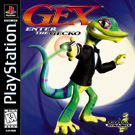 Gex's venture into the third dimension is full of the good, obscure, and the ridiculous. PSMonline's full review |
|
Publisher: Midway Developer: Crystal Dynamics Genre: Adventure/ Platform Origin: U.S. Without a doubt, the meat and potatoes of the videogame industry is the platformer, aka the action/adventure game, the mascot-based side-scroller or the jump-and-runner. Anyway you slice it, ever since Donkey Kong hit the arcades in the early 1980s (followed by Mario, Sonic, Crash, Gex, and a million other wacky mascots with attitood), this kind of game has been loved and cherished by gamers on every new console. To counter Sega and Nintendo's mascots, Crystal Dynamics created Gex for the 3DO in 1995. And along with Nintendo and Sega's mascots, this derivative, but 'wise-crackin' gecko was the only exceptionally likable mascot in the business (Crash hadn't been invented just yet) who didn't meet an uncertain death. This 3D platformer follows the still-brilliant example set by Nintendo's Super Mario 64, with compelling puzzles, large, explorable worlds, a wide swathe of theme-based environments, and, staying with the original gex's sense of humor, a judicial amount of Dana Gould's trademark wise crackin', which I'll get into a little later. Gex: Enter the Gecko takes up where the former game left off in a few ways. Gex is stuck in a colorful, bizarre pop culture-filled land peppered with TV iconography, ghouls, pumpkins and cartoon lookalikes like Elmer Fudd (this happens in a level in which Gex turns into 'wascally wabbitt'). Gex contains loads of levels (more than two dozen), and the slimy creature himself has lots of abilities, including tail-swatting, fly-munching, fly-swallowing (for activating power-ups), ducking and tail-bouncing, amongst others. The game also makes use of various kinds of remotes and collectibles, and each does different things. With red (opens gates, gets access to bosses), silver (one which is hidden, the other is tied to collectibles, and both open bonus levels), and gold (opens secret levels) remotes, the game offers both more gameplay and different objectives than the average platformer. Graphically, the game makes good use of water-wave patterns and animated backgrounds through vertex morphing, and the mix of a large scale of different textures, both bright and gloomy, bring variety and mood into the right perspective with each new level. With such large environments, the developers were forced to use fogging (with the use of translucent polygons) in areas that, once you get there, aren't foggy at all. However, nasty pop-up is well-hidden because of the fog, and this game makes most Acclaim N64 games look like the English moors. In fact, a horde of technical goodies are packed into this game, including z-buffering (breaking up polygons in appropriate areas), animated textures, and cool mirror effects, just to name a few. Gex himself is well animated, and will perform a few funny little acts while waiting around to be used. He also appears in a number of different suits, and sports everything from a kung fu outfit and a 007 tuxedo to Bugs Bunny and Indiana Jones garb. All in all, the game doesn't break any new boundaries graphically, but rather suits the genre with a solid blend of appealing techniques and non-glitchy polygons and sprites in the right places. Possibly, the biggest complaint I have is with the control. Taking its parameters from the Super Mario 64 and Tomb Raider mold, the game enables players to rotate around Gex, and the camera stays wherever you place it, a nice improvement over Mario. Gamers can also choose from digital or analog controls, which is a cool benefit, too; the game is good in digital and better in analog -- just the way it should be. So, what's the problem? Without trying to be nit-picking (and inevitably doing just that), the overall control of Gex is loose, baby. Really loose. Funnily enough, unlike Croc, controlling Gex is like handling a slippery little lizard. And while that should be all the more appropriate for this game, players shouldn't feel frustrated with it, and even after adjusting to the feel, I found that this particular aspect of the game could've used more work and fine-tuning. In the end, Gex is a surprising amount of fun, and gamers will like it because of its off-beat humor, large levels and great replay value. Maybe it's because I like 3D platformers a lot, while other gamers have contentions about them, but I had honest fun playing it, and was compelled to play Gex all the way through to the end.
|
